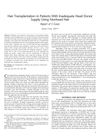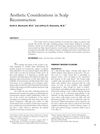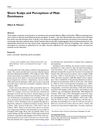 52 citations,
January 1995 in “The Journal of Clinical Endocrinology and Metabolism”
52 citations,
January 1995 in “The Journal of Clinical Endocrinology and Metabolism” Finasteride and spironolactone both reduce hirsutism, but finasteride lowers androgen levels more.
 50 citations,
March 2017 in “PeerJ”
50 citations,
March 2017 in “PeerJ” Using finasteride or dutasteride may cause long-lasting erectile dysfunction.
 45 citations,
October 2014 in “Stem cell research & therapy”
45 citations,
October 2014 in “Stem cell research & therapy” Modified rat stem cells on a special scaffold improved blood vessel formation and wound healing in skin substitutes.
[object Object]  42 citations,
February 2016 in “Science”
42 citations,
February 2016 in “Science” The document concludes that both internal stem cell factors and external influences like the environment and hormones affect hair loss and aging, with potential treatments focusing on these areas.
 36 citations,
January 2012 in “International Journal of Trichology”
36 citations,
January 2012 in “International Journal of Trichology” Losing eyelashes or eyebrows can be a sign of many different health problems and needs a careful approach to treat effectively.
 36 citations,
November 1961 in “Archives of Dermatology”
36 citations,
November 1961 in “Archives of Dermatology” The document suggests that the traditional understanding of hair growth cycles and alopecia may be inaccurate and that blood supply plays a significant role in hair growth and loss.
 29 citations,
September 2012 in “Dermatologic Clinics”
29 citations,
September 2012 in “Dermatologic Clinics” Hair disorders are caused by a complex mix of biology, genetics, hormones, and environmental factors, affecting hair growth and leading to conditions like alopecia.
 26 citations,
October 2012 in “Dermatologic Clinics”
26 citations,
October 2012 in “Dermatologic Clinics” The document details hair transplantation techniques and innovations, highlighting Follicular Unit Transplantation as the standard and discussing the effectiveness and challenges of the procedure.
 25 citations,
May 2011 in “Annals of Plastic Surgery”
25 citations,
May 2011 in “Annals of Plastic Surgery” Nonhead hair transplantation is effective for patients with limited head donor hair, but more research is needed.
 24 citations,
April 2017 in “Journal of Investigative Dermatology”
24 citations,
April 2017 in “Journal of Investigative Dermatology” Age, smoking, and lower BMI increase facial wrinkles; men wrinkle more than women, except in old age; pale skin and certain hormonal factors can protect against wrinkles.
 23 citations,
March 2010 in “Medical hypotheses”
23 citations,
March 2010 in “Medical hypotheses” Merkel cells may have roles in sensing magnetic fields, creating fingerprints, Reiki energy healing, passing on environmental information to offspring, and influencing hair shape.
 23 citations,
December 2004 in “Differentiation”
23 citations,
December 2004 in “Differentiation” Sex hormones affect hair and feather growth and may help manage alopecia and hormone-dependent cancers.
 21 citations,
October 2017 in “Journal of Investigative Dermatology”
21 citations,
October 2017 in “Journal of Investigative Dermatology” The document concludes that understanding dermal papilla cells is key to improving hair regeneration treatments.
 21 citations,
May 1988 in “Journal of The American Academy of Dermatology”
21 citations,
May 1988 in “Journal of The American Academy of Dermatology” The first in-prison dermatology clinic in the U.S. faced challenges and found certain skin conditions common among inmates, with rare cases of serious skin cancer.
 19 citations,
August 2011 in “Facial Plastic Surgery Clinics of North America”
19 citations,
August 2011 in “Facial Plastic Surgery Clinics of North America” Hair grafting is a key method for improving scars, especially in areas with hair, by transplanting hair to hide the scar while maintaining its original characteristics.
 19 citations,
February 2008 in “Facial Plastic Surgery”
19 citations,
February 2008 in “Facial Plastic Surgery” The article concludes that microvascular free flaps, especially the latissimus dorsi flap, are recommended for large scalp reconstructions, and hair transplantation offers high survival rates and excellent aesthetic results.
 19 citations,
July 2006 in “Lasers in medical science”
19 citations,
July 2006 in “Lasers in medical science” Laser hair removal is safe and effective for fair-skinned people with dark hair, and using eflornithine with laser treatments can improve results.
 18 citations,
May 2016 in “Aesthetic Surgery Journal”
18 citations,
May 2016 in “Aesthetic Surgery Journal” Body hair transplantation is an effective method for restoring hair in people with severe baldness and limited scalp donor hair.
[object Object]  18 citations,
June 1988 in “Culture, medicine and psychiatry”
18 citations,
June 1988 in “Culture, medicine and psychiatry” The perception of excessive hair growth in women as abnormal is more influenced by cultural norms than by medical reasons.
 14 citations,
May 2011 in “Facial Plastic Surgery Clinics of North America”
14 citations,
May 2011 in “Facial Plastic Surgery Clinics of North America” Laser hair removal is effective for dark hair but needs improvement for nonpigmented or fine hairs.
 14 citations,
February 2000 in “Feminism & Psychology”
14 citations,
February 2000 in “Feminism & Psychology” The entry showed that PCOS negatively affects women's self-image and is worsened by societal expectations, suggesting a need for more feminist attention to the condition.
 12 citations,
August 2016 in “Current opinion in genetics & development”
12 citations,
August 2016 in “Current opinion in genetics & development” Organs like hair follicles can renew themselves in complex ways, adapting to different needs and environments.
 12 citations,
July 2012 in “Social Psychological and Personality Science”
12 citations,
July 2012 in “Social Psychological and Personality Science” Men with shaved heads are seen as more dominant but older and less attractive.
 12 citations,
January 1981 in “Springer eBooks”
12 citations,
January 1981 in “Springer eBooks” Environmental factors like temperature and nutrition affect hair growth, with humans showing seasonal hair growth differences.
 8 citations,
September 2020 in “Journal of Cosmetic Dermatology”
8 citations,
September 2020 in “Journal of Cosmetic Dermatology” More people are searching for hair transplants online, preferring Follicular Unit Excision over Follicular Unit Transplant. There's also a rise in female patients and interest in beard, eyebrow transplants, and non-surgical treatments like platelet rich plasma.
 8 citations,
March 2019 in “Progress in Human Geography”
8 citations,
March 2019 in “Progress in Human Geography” Hair significantly shapes body identity and social interactions, influencing how we perceive and relate to our bodies.
 8 citations,
January 2015 in “Scars, burns & healing”
8 citations,
January 2015 in “Scars, burns & healing” Hair transplantation effectively treats burn scar alopecia, improving self-esteem and confidence.
 8 citations,
January 2017 in “Fertility and Sterility”
8 citations,
January 2017 in “Fertility and Sterility” Urologic diseases and treatments in older men can negatively affect fertility, and doctors should talk to patients about this.
 7 citations,
October 2019 in “Evidence-based Complementary and Alternative Medicine”
7 citations,
October 2019 in “Evidence-based Complementary and Alternative Medicine” Chinese medicine may help hair growth and reduce hair loss in androgenetic alopecia.
 7 citations,
January 2013 in “BioMed research international”
7 citations,
January 2013 in “BioMed research international” Hair follicles and deer antlers regenerate similarly through stem cells and are influenced by hormones and growth factors.






























